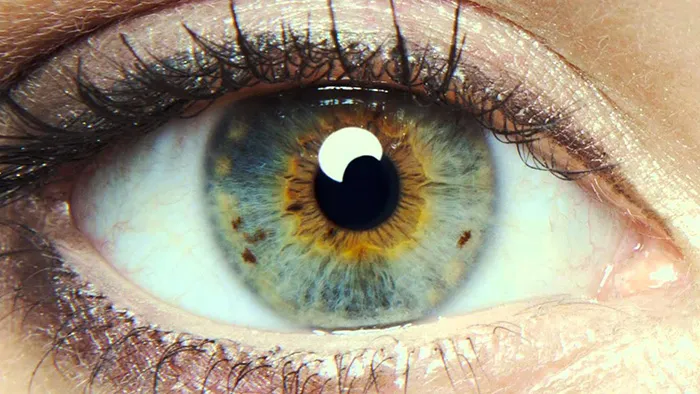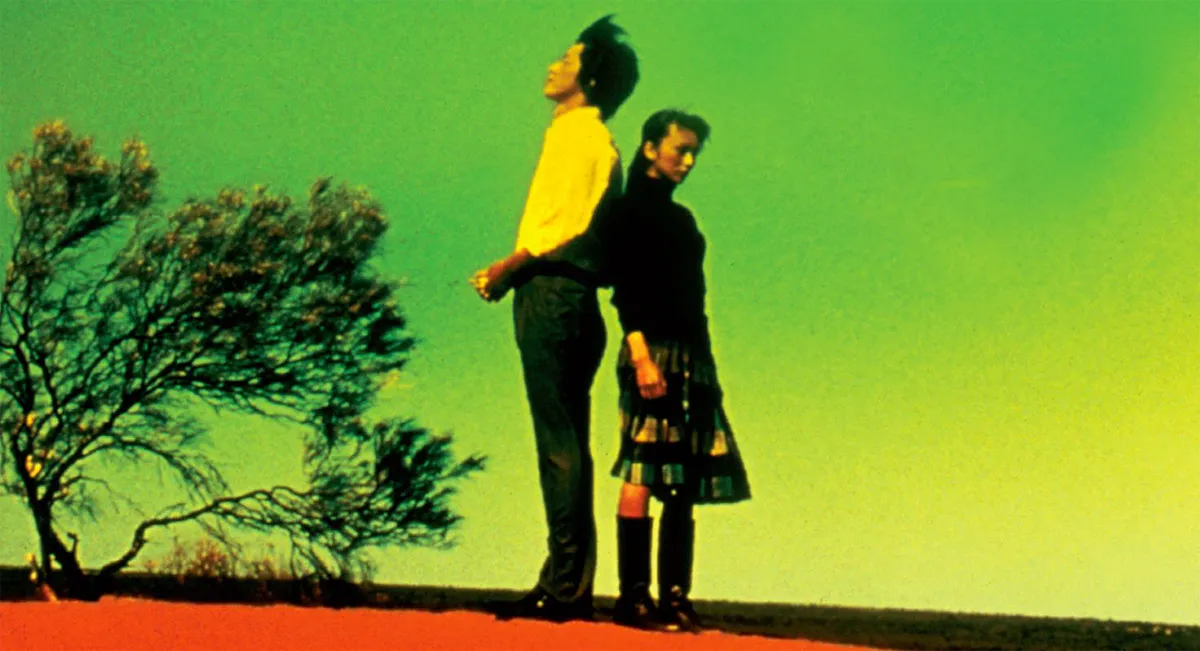
Se trata todo de los ojos
Although we like movies by great directors, blockbusters, and know Bergman, Kurosawa, Nolan, Scorsese and other big names, there are always more modest stories that steal our attention. If we analyze them objectively and with rigorous criteria, they tend to have many flaws and yet there's something in them that touches us, that wakes us up and stays with us. In my particular case, this is one of those movies that without being a cinematographic gem I can't stop watching over and over again.
Aunque nos gusten las películas de grandes directores, las superproducciones y conozcamos a Bergman, Kurosawa, Nolan, Scorsese y otros grandes nombres, siempre hay historias más modestas que nos roban la atención. Si las analizamos objetivamente y con criterios rigurosos, suelen teer muchos defectos y sin embargo hay algo en ellas que nos toca, que nos despierta y se queda con nosotros. En mi caso particular, este es una de esas películas que sin ser una joya cinematográfica no puedo dejar de ver una y otra vez.
The first movie I saw from director Mike Cahill was Another Earth (a strange and interesting movie) and that's why I wanted to see I Origins, released in 2014. The film tells the story of Ian Gray, a student of molecular biology (later a doctor and a respected academic in the field) who has spent years studying the evolution of the eye, from every previous species to the human eye. Moving from the simplest organisms, the study of the eyes of different species stimulates him to two things: 1) Give an eye to a species that doesn't have one and 2) As a consequence of the first, rule out the need for an upper hand of intelligent design for the human eye. In other words, since there's no direct evolutionary line of the human eye, a creator (God) is assumed but if Ian manages to give eyes to an organism that doesn't have them, God would be left over in the equation. So at first, it's science fiction mixed with a bit of religious philosophy.
La primera película que vi del director Mike Cahill fue Another Earth (una película extraña e interesante) y por eso quise ver I Origins, estrenada en 2014. En la cinta se cuenta la historia de Ian Gray, un estudiante de biología molecular (después doctor y académico respetado en el campo) que ha dedicado años a estudiar la evolución del ojo, desde cada especie anterior hasta el ojo humano. Pasando desde los organismos más sencillos, el estudio de los ojos de diferentes especies lo estimula a dos cosas: 1) Darle un ojo a una especie que no lo tenga y 2) Como consecuencia de lo primero, descartar la necesidad de una mano superior, de un diseño inteligente para el ojo humano. En otras palabras, como no hay una línea evolutiva directa del ojo humano, se presupone un creador (Dios) pero si Ian logra darle ojos a un organismo que no los tenga, Dios sobraría en la ecuación. Así que, en un inicio, se trata de ciencia ficción mezclada con un poco de filosofía religiosa.
Obsessed with the subject, Ian likes to photograph people's eyes, he collects them to create a huge database. At a costume party, he meets a mysterious woman who's enmasked but whose eyes have multi-colored irises that totally attract him. After that chance meeting, fascinated by those eyes, he yearns for her without even knowing her name or how she looked. From then on, the dialogue that will mark the entire film will begin: science vs. religion; reason vs faith.
Obsesionado con el tema, a Ian le gusta fotografiar los ojos de las personas, los recolecta para crear una inmensa base de datos. En una fiesta de disfraces, conoce a una misteriosa mujer que lleva el rostro vendado pero cuyos ojos tienen un iris multicolor que lo atraen totalmente. Tras ese encuentro casual, fascinado por aquellos ojos, la anhela sin saber si quiera su nombre o cómo se veía. A partir de entonces comenzará el diálogo que marcará toda la película: ciencia vs religión; razón vs fe.
Chance, fate, or whatever you want to call it is what seems to lead Ian back to those eyes. The girl's name is Sofi and she's a young multi-ethnic beauty who couldn't be more different from Ian, so logically they fall in love and after the brief romance, they get married. Sofi is free, she believes in angels, in the paranormal, in the afterlife. Ian believes in science, in facts, in statistics. Despite the differences, perhaps because of it, they love each other very much. One of the most stimulating parts of the film are those dialogues that take place between Ian and Sofi in which he is all science, all rational and she is a faithful defender of the fantastic, of what escapes our ability to reason. There are metaphors, examples and anecdotes that by themselves are a matter of reflection.
El azar, el destino, o como quieran llamarle es quien parece conducir a Ian de vuelta a esos ojos. La chica se llama Sofi y es una joven de belleza multi-étnica que no podría ser más diferente a Ian, por lo que lógicamente se enamoran y tras el breve romance, se casan. Sofi es libre, cree en ángeles, en lo paranormal, en el más allá. Ian cree en la ciencia, en los hechos, en las estadísticas. A pesar de lo diferentes, quizás a causa de ello, se aman mucho. Una de las partes más estimulantes de la cinta son esos diálogos que se producen entre Ian y Sofi en las que él es todo ciencia, todo racional y ella una fiel defensora de lo fantástico, de lo que escapa de nuestra capacidad de razonamiento. Hay metáforas, ejemplos y anécdotas que por sí mismas son materia de reflexión.
After some facts that I'm not going to reveal Ian loses Sofi and years later, after an amazing discovery that ripped him out of the spite in which he was mired, Ian manages to change the way human existence was perceived up to that moment. Something like an eye map is created and what would come to be an eye identification system as unique as fingerprints. Beyond color, the scientist explains, a person's eyes have unique characteristics, so in theory, no two pairs of eyes can be the same. So when the first anomalies appear, what can you think? When you meet two people with the same eye pattern, that should disprove the uniqueness theory, right? but when, in all cases, one of the two parties has died, even before the birth of the other, what can one think? Is this eye map a window to the soul? Does science confirm reincarnation? They are interesting questions, after which Ian pursues a morenot so scientific objective: to find those eyes that he once fell in love with.
Tras algunos hechos que no voy a revelar Ian pierde a Sofi y años más tarde, después de un descubrimiento asombroso que lo arrancó del despecho en el que estaba sumido, Ian logra cambiar la forma en que era percibida la existencia humana hasta ese momento. Se crea algo así como un mapa del ojo y lo que vendría a ser un sistema de identificación ocular tan único como las huellas digitales. Más allá del color, expone el científico, los ojos de una persona tiene características únicas por lo que en teoría, no puede haber dos pares de ojos iguales. Entonces, cuando se presentan las primeras anomalías, ¿qué se puede pensar? cuando se encuentran dos personas con el mismo patrón ocular, eso debería refutar la teoría de la unicidad ¿cierto? pero cuando, en todos los casos, una de los dos partes ha fallecido, incluso antes del nacimiento del otro ¿qué se puede pensar? ¿este mapa del ojo es una ventana al alma? ¿la ciencia confirma la reencarnación? son cuestionamientos interesantes, tras los cuales Ian persigue un objetivo más que científico: volver a encontrar esos ojos que lo enamoraron una vez.
I've seen this movie about three or four times and would see it again. It has an interesting mix of science fiction, philosophy, religion, a debate between fate and chance, a lot of romance, something of a thriller, a search, a revelation, perhaps an achievement of fusing science and religion into a single subject, all combined in one modest budget production with some flaws in the script, but that for some reason stays in your retina and in your mind. It's a movie that makes me feel every time I watch it and makes me ask and try to answer all the questions Ian and Sofi ask themselves, is this connection to I Origin proof of a deep longing for believe in something else? Is the film itself a reflection of one of the deepest dilemmas of my own soul? I don't know. I can only add that this is one of my favorite independent films of all time and I can't wait to see it again.
He visto esta película unas tres o cuatro veces y la volvería a ver. Tiene una mezcla interesante de ciencia ficción, filosofía, religión, debate entre destino y azar, mucho romance, algo de thriller, una búsqueda, una revelación, quizás un logro de fundir ciencia y religión en una sola materia, todo ello combinado en una producción de presupuesto modesto, con algunas fallas en el guión, pero que por alguna razón se te queda en la retina y en la mente. Es una película que me hace sentir cada vez que la veo y que me hace preguntar e intentar responder todas las preguntas que se hacen Ian y Sofi, ¿es esta conexión con I Origin la prueba de un profundo anhelo de creer en algo más? ¿es la película en sí un reflejo de uno de los dilemas más profundos de mi propia alma? No lo sé. Sólo puedo agregar que esta es una de mis películas independientes favoritas de todos los tiempos y que ya tengo ganas de volverla a ver.









